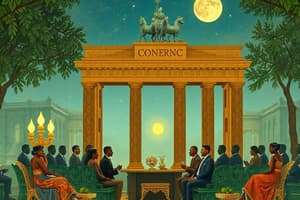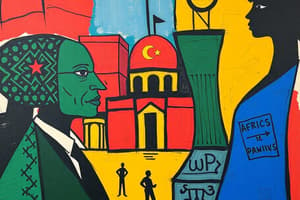Podcast
Questions and Answers
What was one of the key objectives of the Berlin Conference?
What was one of the key objectives of the Berlin Conference?
- To promote free trade along the Congo and Niger Rivers (correct)
- To establish direct African representation in European affairs
- To prevent any form of colonization in Africa
- To increase trade only for European nations
Which principle required European powers to demonstrate control over a territory to claim it?
Which principle required European powers to demonstrate control over a territory to claim it?
- Notification of other powers
- Territorial sovereignty
- Free access policy
- Effective occupation (correct)
What was a significant outcome of the Berlin Conference?
What was a significant outcome of the Berlin Conference?
- Establishment of peaceful cooperation among African nations
- Implementation of a coordinated trade agreement among African regions
- Formation of a unified African political entity
- Creation of arbitrary borders disregarding indigenous cultures (correct)
Which major power did NOT take part in the Berlin Conference?
Which major power did NOT take part in the Berlin Conference?
What aspect of the Berlin Conference contributed to long-term conflicts in Africa?
What aspect of the Berlin Conference contributed to long-term conflicts in Africa?
Flashcards are hidden until you start studying
Study Notes
Overview
- The Berlin Conference took place from November 15, 1884, to February 26, 1885.
- Convened by Otto von Bismarck, the Chancellor of Germany.
- Aimed to regulate European colonization and trade in Africa.
Key Players
- Major European powers attended: Germany, France, Britain, Portugal, Belgium, Italy, and Spain.
- No African representatives were present, which highlighted the disregard for African sovereignty.
Objectives
- To avoid conflict among European nations over African territories.
- To establish guidelines for the colonization and trade in Africa.
- To promote free trade along the Congo River and around the Niger River.
Outcomes
- Division of Africa into European-controlled territories without consideration for indigenous cultures or communities.
- Formalized the "Scramble for Africa," leading to rapid colonization.
- Signaled the start of increased imperial competition in Africa.
Principles Established
- Effective occupation: European powers needed to demonstrate control over a territory to claim it.
- Notification of other powers: Countries were required to inform others when they occupied African land.
- Free access to all nations on specific African rivers, promoting trade.
Legacy
- The conference contributed to the exploitation and oppression of African peoples during colonial rule.
- It ignored ethnic, cultural, and linguistic boundaries, causing long-term conflicts.
- The arbitrary borders drawn still affect political and social dynamics in contemporary Africa.
The Berlin Conference
- Convened in 1884 by Otto von Bismarck, Chancellor of Germany
- Aimed to regulate European colonization of Africa, primarily focused on trade
Key Players
- Major European Powers: Germany, France, Great Britain, Portugal, Belgium, Italy, and Spain
- No African representatives were present
Objectives
- To avoid conflict among European nations over African territories
- To establish rules for colonization and trade in Africa
- To promote free trade along the Congo and Niger rivers
Outcomes
- The division of Africa into European colonies, without consideration for existing African communities or culture
- The "Scramble for Africa" was formalized, leading to rapid colonization
- The Conference signaled the beginning of increased imperial competition in Africa
Established Principles
- European powers had to demonstrate control of a territory to claim it
- Countries were required to inform others when they claimed African land
- Free access to all nations on specific African rivers, promoting trade
Legacy
- The conference contributed to the exploitation and oppression of African peoples during colonial rule
- The conference ignored ethnic, cultural and linguistic boundaries, leading to long-lasting conflicts
- The arbitrary borders imposed by the conference still affect contemporary African politics and society
Studying That Suits You
Use AI to generate personalized quizzes and flashcards to suit your learning preferences.




